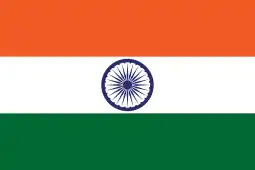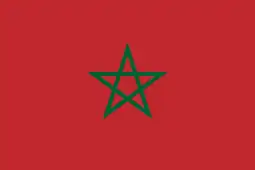 | |
| Tournament information | |
|---|---|
| Sport | Chess |
| Location | Hyderabad, India |
| Dates | 9 October 2002–22 October 2002 |
| Administrator | FIDE |
Tournament format(s) | Multi-stage tournament |
| Host(s) | All India Chess Federation |
| Venue(s) | Ramoji Film City |
| Purse | $180,000 |
| Final positions | |
| Champion | |
| Runner-up | |
The FIDE World Cup 2002, marketed as the Second Chess World Cup, was a 24-player Category XVI chess tournament played between 9 October and 22 October 2002 in Hyderabad, India.[1] The tournament was hosted at Ramoji Film City and organized by FIDE in conjunction with the All India Chess Federation. Former World Cup winner Viswanathan Anand defeated Rustam Kasimdzhanov in the final to retain the title.[2]
Format
The tournament began with a league stage, consisting of 4 groups of six players each. Each player played a game against each of the other players in his group once. At the end of the group stage, the top two players from each group progressed to the quarterfinals. In the knockout rounds, each player played a two-game match against his opponent. If the match was tied after the regular games, blitz tie-breaks were used to determine a winner.[3]
Participants
All players are Grandmasters unless indicated otherwise.
 Viswanathan Anand (IND), 2755
Viswanathan Anand (IND), 2755 Vassily Ivanchuk (UKR), 2709
Vassily Ivanchuk (UKR), 2709 Alexander Morozevich (RUS), 2707
Alexander Morozevich (RUS), 2707 Nigel Short (ENG), 2684
Nigel Short (ENG), 2684 Alexey Dreev (RUS), 2673
Alexey Dreev (RUS), 2673 Vladimir Malakhov (RUS), 2670
Vladimir Malakhov (RUS), 2670 Krishnan Sasikiran (IND), 2670
Krishnan Sasikiran (IND), 2670 Ye Jiangchuan (CHN), 2667
Ye Jiangchuan (CHN), 2667.svg.png.webp) Zurab Azmaiparashvili (GEO), 2666
Zurab Azmaiparashvili (GEO), 2666 Sergei Rublevsky (RUS), 2664
Sergei Rublevsky (RUS), 2664 Rustam Kasimdzhanov (UZB), 2653
Rustam Kasimdzhanov (UZB), 2653 Alexander Beliavsky (SLO), 2650
Alexander Beliavsky (SLO), 2650 Xu Jun (CHN), 2643
Xu Jun (CHN), 2643 Teimour Radjabov (AZE), 2628
Teimour Radjabov (AZE), 2628 Bartłomiej Macieja (POL), 2615
Bartłomiej Macieja (POL), 2615 Giovanni Vescovi (BRA), 2614
Giovanni Vescovi (BRA), 2614 Jaan Ehlvest (EST), 2600
Jaan Ehlvest (EST), 2600 Hichem Hamdouchi (MAR), 2593
Hichem Hamdouchi (MAR), 2593 Alex Yermolinsky (USA), 2575
Alex Yermolinsky (USA), 2575 Pentala Harikrishna (IND), 2551
Pentala Harikrishna (IND), 2551 Mohammed Al-Modiahki (QAT), 2550
Mohammed Al-Modiahki (QAT), 2550 Surya Ganguly (IND), 2531, IM
Surya Ganguly (IND), 2531, IM Saidali Iuldachev (UZB), 2511
Saidali Iuldachev (UZB), 2511 Watu Kobese (RSA), 2399, IM
Watu Kobese (RSA), 2399, IM
Calendar
| Round | Dates |
|---|---|
| Group Stage | 5–13 October |
| Quarterfinals | 15–16 October |
| Semifinals | 17–18 October |
| Final | 19–20 October |
Group stage
The group stages featured a number of surprising upsets, with the top three seeds all struggling to remain in contention. Anand, the No. 1 seed, overcame an early loss to Krishnan Sasikaran with wins over Kasimdzhanov and Al-Modiahki to finish second in his group. Vassily Ivanchuk was less fortunate, dropping games to Malakhov and Macieja and finishing fifth in Group A.[4] Morozevich never recovered after suffering a disastrous start with three straight losses to Ehlvest, Ganguly, and Harikrishna. He scored only one point in five matches, finishing second-to-last in the entire tournament and dropping below 2700 in Elo rating for the first time since 1998.[5]
| Group A | Pts. | Group B | Pts. | Group C | Pts. | Group D | Pts. |
|---|---|---|---|---|---|---|---|
| 3½ | 3½ | 3½ | 3½ | ||||
| 3 | 3 | 3 | 3½ | ||||
| 3 | 3 | 2½ | 3½ | ||||
| 3 | 2½ | 2½ | 2 | ||||
| 2 | 1½ | 2 | 1½ | ||||
| ½ | 1½ | 1½ | 1 |
Playoffs
| Quarterfinals | Semifinals | Final | ||||||||||||
| 1½ | ||||||||||||||
| ½ | ||||||||||||||
| ½ | ||||||||||||||
| 1½ | ||||||||||||||
| ½ | ||||||||||||||
| 1½ | ||||||||||||||
| ½ | ||||||||||||||
| 1½ | ||||||||||||||
| 1½ | ||||||||||||||
| 2½ | ||||||||||||||
| 2½ | ||||||||||||||
| 3½ | ||||||||||||||
| ½ | ||||||||||||||
| 1½ | ||||||||||||||
Final
In the final, Viswanathan Anand defended his World Cup title won in Shenyang against Rustam Kasimdzhanov in a two-game match. The first game of the match ended in a 16-move draw, with Kasimdzhanov failing to make any headway against Anand's Caro-Kann defence. In Game 2, Anand gradually outplayed Kasimdzhanov in the Petroff defence, gaining a strong advantage after 18 ... N6g5?. Kasimdzhanov would resign 11 moves later.[6]
| Name | Rating | 1 | 2 | Total |
|---|---|---|---|---|
| 2755 | ½ | 1 | 1½ | |
| 2653 | ½ | 0 | ½ |
References
- ↑ "Anand for World Cup". The Hindu. 25 September 2002. Archived from the original on 26 December 2016.
- ↑ "CB News: The winners of Hyderabad".
- ↑ "The Week In Chess: FIDE World Cup in Hyderabad (Wayback Machine Internet Archive)". Archived from the original on 5 July 2009.
{{cite web}}: CS1 maint: bot: original URL status unknown (link) - ↑ "CB News: Indian ladies dazzle in Hyderabad".
- ↑ "2700.com - Morozevich, Alexander".
- ↑ "The Hindu: Anand retains world title".